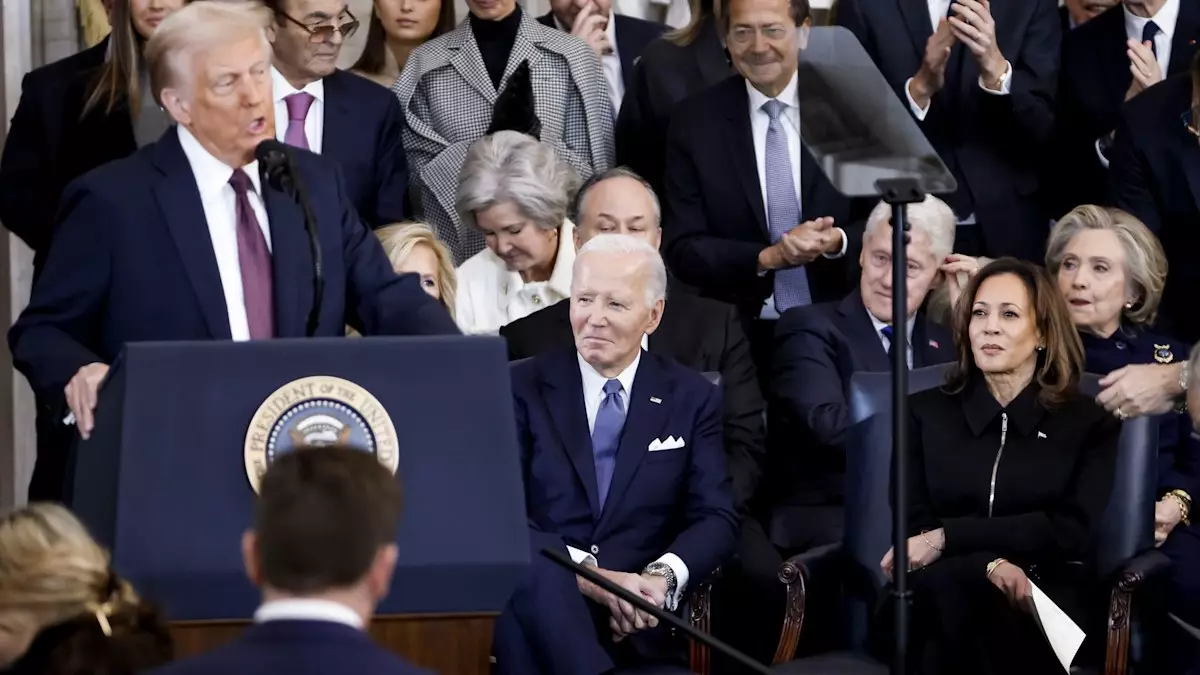In a striking display of political bravado, Donald Trump delivered a compellingly decisive speech on the day of his inauguration. This moment was far more than a mere formality; it served as an audacious platform for Trump to project his vision for America and simultaneously launch broadsides at his predecessor, Joe Biden, who sat in the audience. Given the charged political atmosphere, the address encapsulated not only Trump’s aggressive agenda but also the polarization that has come to define modern American politics.
Right from the outset, Trump did not shy away from confrontation. His remarks were laced with criticisms directed at Biden, stating bluntly that his administration had failed to manage even simple crises—a clear jab at the current leadership at a time when the nation is grappling with various challenges. His mention of the recent shooting incident targeting him at a Pennsylvania rally added a personal touch, showcasing his narrative of survival and resilience while dismissing any semblance of bipartisan unity. In contrast, the Democrats, represented by Biden and Kamala Harris, remained seated and stoic during moments that elicited applause from Trump supporters, symbolizing the deep-seated rift between opposing political factions.
This moment was not just a chance for Trump to tout his triumph; it was also an opportunity to emphasize what he framed as a ‘mandate from the people’—a theme that has been pivotal in his political arsenal. The rhythm of his speech, punctuated with declarations of reclaiming American freedoms and destinies, reflected a populist tone that resonates deeply with his base. However, one must consider: was this a genuine call for unity, or merely a strategy to galvanize his supporters while alienating the opposition?
Central to Trump’s speech was an evocative narrative of restoration. He positioned his administration as the solution to perceived betrayals over the past years, vowing to restore integrity and competency in governance. This statement echoes a broader populist trope: the idea that the establishment has failed the ordinary citizen—a sentiment that, while it may galvanize supporters, risks deepening the sense of disenchantment among those who disagree.
Trump also made bold claims regarding national security and fiscal policies, such as reinstating strict immigration laws and reasserting control over significant national assets, like the Panama Canal. These policies underscore a return to nationalism that resonates deeply with his supporters. Yet, consumers of this rhetoric should critically examine whether such promises can realistically address the multifaceted challenges facing the nation.
As his speech drew to a close, Trump painted a vivid picture of an America poised for what he termed a “golden age.” With phrases like “compassion, courage, and exceptionalism,” he crafted a narrative that aimed to rally the American spirit in a time of division. This rhetoric is compelling, yet it invites an important question: how can one reconcile the vision of unity being espoused with the divisive tactics frequently employed in political discourse?
Such grand proclamations often serve to solidify a campaign-style ethos, lacking a substantive plan behind them. Additionally, the promise of respect and admiration for America on the global stage, while alluring, raises skepticism about the feasibility of achieving such status through the so-called ‘America First’ policies.
Trump’s inaugural speech was a masterclass in political theater, rife with emotional appeals and sharp-edged rhetoric. While it undoubtedly stirred enthusiasm among his followers, it also starkly illustrated the continuing divide in American politics. The veiled barbs aimed at Biden, the grandiose promises of restoration, and the invocation of a golden future serve as both an invitation to rally and a challenge to those who oppose him. As the nation moves forward, the implications of such a divisive speech linger, posing a pivotal question—can the fabric of American democracy be woven together, or will it continue to fray in the throes of partisan discord?
